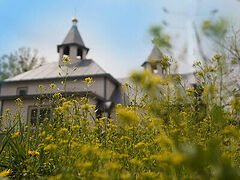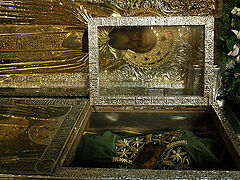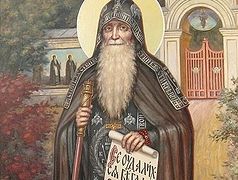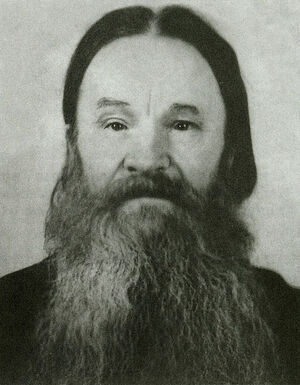 Hierodeacon Sophrony (Kuzin) On July 17 the Holy Trinity-St. Sergius Lavra commemorates Hierodeacon Sophrony (Kuzin), who departed to the Lord on this day in 2001. “Unusual, strange, rude, unsociable”—you could hear such epithets to describe the hierodeacon in his lifetime. “You’re useless, Sophrony!” brethren used to say to him angrily. “The Russian Orthodox Church has been preserved by Sophronies, just as Holy Rus’ was by Ivans,” the monk would reply with a frowning glance. And it was not until after the blessed repose of this “impolite” and straightforward man that the true meaning of these words became clear. When the brethren began to gradually tell each other the episodes they had witnessed, the depth of the this simple hierodeacon’s spiritual labors and the wealth of his secret virtues were revealed.
Hierodeacon Sophrony (Kuzin) On July 17 the Holy Trinity-St. Sergius Lavra commemorates Hierodeacon Sophrony (Kuzin), who departed to the Lord on this day in 2001. “Unusual, strange, rude, unsociable”—you could hear such epithets to describe the hierodeacon in his lifetime. “You’re useless, Sophrony!” brethren used to say to him angrily. “The Russian Orthodox Church has been preserved by Sophronies, just as Holy Rus’ was by Ivans,” the monk would reply with a frowning glance. And it was not until after the blessed repose of this “impolite” and straightforward man that the true meaning of these words became clear. When the brethren began to gradually tell each other the episodes they had witnessed, the depth of the this simple hierodeacon’s spiritual labors and the wealth of his secret virtues were revealed.
Hierodeacon Sophrony (secular name: Sergei Nikanorovich Kuzin) was born on September 19, 1922 in the village of Dunaevka in the Yuriev-Polsky district of Vladimir province to a worker’s family. He completed four grades of an elementary school. For some time he lived in an orphanage—his mother died and his father was killed at the front.
At the end of the first year of the Great Patriotic War (in the USSR: 1941–1945), Sergei was drafted into the army, but he did not have to go to the front line—he was sent to the Trans-Baikal Front. He did not take off his cross, although he was threatened and even called a “traitor”. Later Fr. Sophrony recalled: “During the war I didn’t fire a single shot—I simply couldn’t shoot.”
After the war Sergei served in the paramilitary guard for a couple of years, and in 1948 he became eager to enter the Holy Trinity-St. Sergius Lavra. The first time he tried, he was refused because he had no residence permit. But so great was his desire to serve St. Sergius that he decided to get a job as a herdsman in one of the collective farms of the Zagorsk (now Sergiyev Posad) district, earn money to obtain his residence permit and then go to the Lavra. Sergei gained the confidence of the chairman, although he said nothing about his plans to enter the Lavra, and for six years he took care of livestock. When the time finally came and he received the documents, the chairman told him: “But be sure not to go to the monastery!” He replied calmly, even challengingly: “I’ll go for sure!” The chairman was furious, but there was nothing he could do...
In February 1954, Sergei came to the Lavra and was admitted as a novice. On August 21, 1956, the monastery’s father-superior, Archimandrite Pimen (Izvekov), the future Patriarch Pimen, tonsured him with the name Sophrony—in honor of St. Sophronius, Archbishop of Cyprus. On the feast of the Annunciation in 1958, Bishop Seraphim (Sharapov) of Poltava and Kremenchug[1] ordained him hierodeacon.
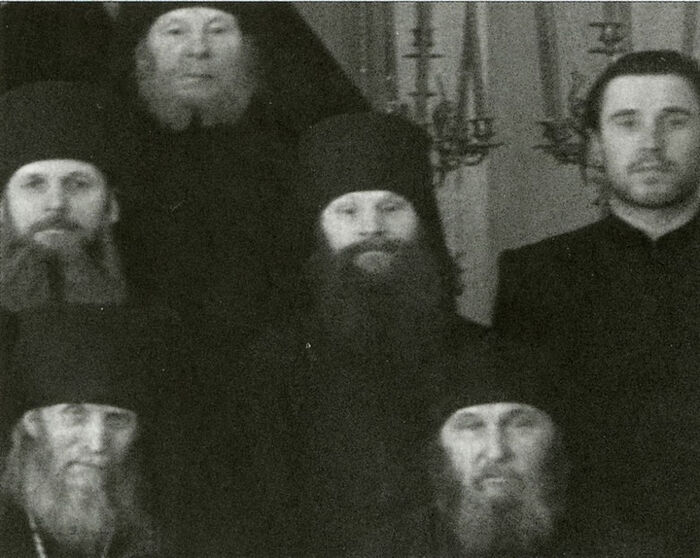 Hierodeacon Sophrony (in the center). Fragment of a photo of the brethren, February 16, 1963
Hierodeacon Sophrony (in the center). Fragment of a photo of the brethren, February 16, 1963
At first, Fr. Sophrony worked in the kitchen, performed obediences as a watchman and a cleaner, then he worked for three years in the prosphora bakery. Upon his ordination as a hierodeacon, at the very first service, he came out of the altar and read all the petitions of the litany printed in the Service Book at once without stopping. But soon he got the feel of the service and served properly.
Fr. Sophrony had a special relationship with the brethren’s father-confessor, Archimandrite Kirill (Pavlov). When Fr. Kirill served as a treasurer, Hierodeacon Sophrony had an obedience that no one knew about: he would come to the treasurer and receive money for poor people. Then he would go out and appear at the monastery entrance, where he distributed this money among the needy, as if from himself. Thanks to this, Fr. Kirill was able to avoid attacks and temptations associated with giving alms in those difficult years.
Fr. Sophrony was very fond of the Lavra’s poor parishioners. He distributed his pension among poor people as well. If asked, he could, without any regret, give away the money at once. He found his mission in love for the poor and in non–possession—two virtues that complement each other. He found discarded bottles, then cleaned and washed them. After the brethren’s meal he collected the leftovers on the tables, poured compote and fruit juice into bottles, and took it all out to beggars already waiting for him at the brethren’s gate. Fr. Sophrony in some incomprehensible way saw which of them needed help the most. He celebrated his name day in a very peculiar way: After lunch he would take out a large tray with plenty of various treats to the monastery entrance. He constantly gave bread leftovers from the brethren’s meal to the birds.
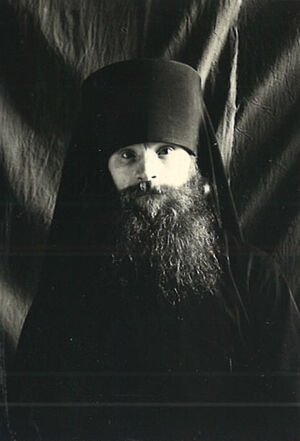 His cell was extremely ascetic and had a very deplorable order. It required urgent repair, but Fr. Sophrony refused to repair it. There were only a table, a bench, a chair and a bed there, complete with an old ryassa and a cassock, with which an interesting story is connected. One day the father-superior gave the hierodeacon a personal obedience—to replace the old, short cassock with a new one: “Father Sophrony, why do you wear such old clothes? Go to the sewing room, let them take your measurements, and we will sew you a new one.” Once Fr. Sophrony received a new cassock, he took an axe and cut off the lower part of it near the brethren’s bathhouse, where birch firewood was chopped, after which he continued to wear the old ankle–length cassock.
His cell was extremely ascetic and had a very deplorable order. It required urgent repair, but Fr. Sophrony refused to repair it. There were only a table, a bench, a chair and a bed there, complete with an old ryassa and a cassock, with which an interesting story is connected. One day the father-superior gave the hierodeacon a personal obedience—to replace the old, short cassock with a new one: “Father Sophrony, why do you wear such old clothes? Go to the sewing room, let them take your measurements, and we will sew you a new one.” Once Fr. Sophrony received a new cassock, he took an axe and cut off the lower part of it near the brethren’s bathhouse, where birch firewood was chopped, after which he continued to wear the old ankle–length cassock.
Hierodeacon Sophrony was notable for his laconicism. If he spoke, it was very weighty and deep, and he could beat any monastery wit. His answers became real aphorisms. One day at the refectory an archimandrite sat down next to Fr. Sophrony and said to him with familiarity and love at the same time: “Father Sophrony, how nice it is to eat next to you!” He replied very seriously and calmly: “Will it be nice to sit with me in hell, too?” According to the brethren’s recollections, Hierodeacon Sophrony often spoke rudely. He could go to the store, ask for candy, and instead of “thank you” say, “Ugh, what a mess!”, and leave.
During his visits to the Lavra, Patriarch Pimen liked to see the brethren—to go inside their cells and see how they lived; he was interested in how the brethren prayed, how they worked, and he wondered whether they needed something... One day he decided to pay a visit to Fr. Sophrony. He knocked on the door of his cell, but there was no answer. He knocked again, but to no avail. He knocked for the third time, this time with the words: “Fr. Sophrony, open up please. It’s Patriarch Pimen.” But the hierodeacon demanded, “Say the prayer!” After His Holiness had humbly said, “Through the prayers of our Holy Fathers...”, Fr. Sophrony opened the door and asked: “Why have you come? Actually, I didn’t call you.”
However, Hierodeacon Sophrony could not be accused of irreverence towards the Church hierarchy. His true attitude towards the Primate was demonstrated once during a festive occasion on his name day, albeit in a manner peculiar to Fr. Sophrony. When they were toasting and raising glasses to “His Holiness the Patriarch, the ruling abbot of the Holy Trinity-St. Sergius Lavra”, everyone stood up, except Fr. Sophrony. The protodeacon who was standing opposite him rebuked him: “Fr. Sophrony, drink a toast to His Holiness!” And he replied: “We should pray rather than drink for His Holiness.”
Fr. Sophrony’s main obedience was to keep watch at the church at night on the eves of the major feasts. At that time there was a tradition at the Lavra: churches were not closed at night on the eves of Sundays and the great feasts. Pilgrims could stay here all night until the early Liturgy—to read the preparatory prayers before Holy Communion and rest. Fr. Sophrony removed the chairs and benches before the Liturgy, dragging them across the floor all over the church to the candle box. Soon a deafening crash could be heard—he was throwing a bench or a chair over the barrier of the candle box where they used to stand. So in a peculiar way he would put things in order. After night vigils he often took Communion in his old cassock with the laypeople.
One day an electrical leakage was discovered in the St. Barbara cell building. Trying to find out what was the matter, they went to inspect the cells. And the inspector was dumbfounded when he entered Fr. Sophrony’s cell: He found that there stood several working electric stoves in a row under his bed, and the hierodeacon lay there quietly “roasting himself”!
And, as opposed to this, on bathing days he liked to get into a basin with icy cold water. When one of the brothers wanted to take a dip after the steam room, he did not let them do it. “He would silently paddle about in the cold water, humming something,” a monk recalls. “At the same time, he answered spiritual questions. I am still grateful to him for his answers ‘from the bath’, which helped me solve quite difficult problems...”
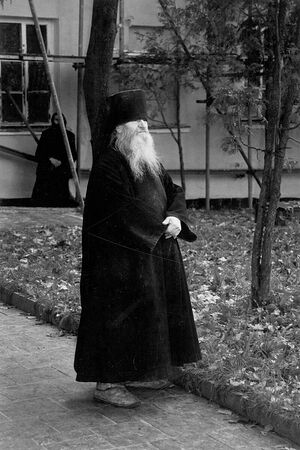 Hierodeacon Sophrony always spoke to the point, and often in such a way that the subject of a conversation was revealed from an unexpected perspective. For all his inimitable feigned foolishness, he knew how to behave quite decently. This became clear when Fr. Onuphry (Berezovsky; now His Beatitude Metropolitan of Kiev and All Ukraine) invited him to spend some time at the Pochaev Lavra. During the trip, Fr. Sophrony behaved perfectly and did not allow himself any liberties.
Hierodeacon Sophrony always spoke to the point, and often in such a way that the subject of a conversation was revealed from an unexpected perspective. For all his inimitable feigned foolishness, he knew how to behave quite decently. This became clear when Fr. Onuphry (Berezovsky; now His Beatitude Metropolitan of Kiev and All Ukraine) invited him to spend some time at the Pochaev Lavra. During the trip, Fr. Sophrony behaved perfectly and did not allow himself any liberties.
Hierodeacon Sophrony had a clear mind to the very end. He knew how to make a good joke and clear the air. When they were going to send him to the hospital and couldn’t find his sweater, he joked: “The sweater has gone to St. Petersburg.”
Perhaps Fr. Sophrony was often “playacting” so that no one would approach him and distract him from his prayerful mood and inner stillness. He lived in isolation from the vanity of this world, did not communicate with any of the brethren, and spoke little. He did not believe in “recreational” vacations and almost never left the Lavra.
After the brethren’s dinner, Hierodeacon Sophrony would usually go to perform the evening monastic prayer rule. He would lie down on a bench with his head by the bishop’s chair, behind which the reader was standing, and sometimes knelt, leaning on the bench, furtively wiping away his tears. Every Saturday he came to the altar to the brethren’s father-confessor and confessed his sins for a long time.
As long as his eyesight was good enough, Fr. Sophrony together with the brethren read the synodics (commemoration books for the living and the dead) at services. One day a monk handed him the second synodic and heard in response: “Do you think I have two heads that I can read two synodics simultaneously?” He usually did not respond to requests for prayer, but then everything that he had been asked to pray about was sorted out.
At the hospital Fr. Sophrony constantly asked his cell-attendant to read him the five prayers in honor of the Mother of God [devoted to Her five sorrows and composed by the Holy Hierarch Dimitry of Rostov.—Trans.]. During this reading he was moved and wept. He could not listen to prayers with the mention of the name of the Theotokos without shedding tears. During the final year of his illness, something was revealed behind the appearance of this “ordinary man” that no one had previously known. Lying in bed, Fr. Sophrony prayed to the Mother of God all day long with tears incessantly: “O Queen of Heaven, help me! O Sovereign Lady, save me!” The cell-attendant who was by his side was uncomfortable, sensing that the elder was continuously in contact with the spiritual realm...
When they were going to send Fr. Sophrony to the hospital, the brethren found a thick notebook filled up with notes in large primary-school handwriting. It contained spiritual poems, sayings, the Lives of saints, ascetics of Mt. Athos, Russian epics, and songs with deep spiritual and edifying meaning. When asked whose notebook it was, Fr. Sophrony gave a vague reply: “I don’t know, someone brought it...” But after his death it turned out that the handwriting was his. In fact, it was not a notebook, but a shapeless pile of over twenty school notebooks of different sizes, clumsily put together—almost 800 pages! It was clear that the hierodeacon often reread them, but concealed it from others...
Hierodeacon Sophrony passed away on July 17, 2001, on the eve of the summer feast of St. Sergius of Radonezh, on the day when the newly-canonized holy Royal Martyrs were liturgically commemorated for the first time. He fell asleep in the Lord while kneeling in prayer and in solitude. He was found in this position by his cell-attendant... The body of the deceased was transferred to the crypt of the Dormition Cathedral—to the Church of All Saints Who Shone Forth in the Russian Lands. As always, many bishops gathered at the Lavra for the feast, many of whom knew Fr. Sophrony personally. The archpastors came, bade farewell to him and blessed his body in the coffin. The funeral service was performed by the father-superior on the third day after his death, which coincided with the feast of the Synaxis of the Radonezh Saints. During the farewell litya in front of the Dormition Gate, Fr. Sophrony received the last archpastoral blessing from Archbishop Sergei of Ternopil, who had just celebrated the Liturgy at the Chapel of the Saints of Radonezh. The senior clergy noticed that none of the monks who had died since the end of WWII had been vouchsafed such an archpastoral blessing.

